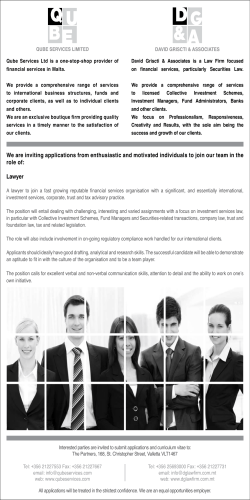
why business development coaching?
WHY BUSINESS DEVELOPMENT COACHING? BY JOAN NEWMAN Our Changing Legal Landscape The economic recession has caused a paradigm shift in the way law firms do business. Firms are settling into a new “normal” and beginning to change the way they deliver legal services. These changes include smaller associate classes, reduced associate/partner leverage, increased number of contract attorneys, reduced equity partner ranks, value based billing and alternative fee arrangements, and key client programs to manage client relationships more effectively and consistently. Firms are scrambling to find ways to differentiate themselves and bring greater value and exceptional service to clients more efficiently and profitably. Clients are driving some of these changes - demanding more predictable legal costs, lower billing rates, different billing structures, and more efficient legal project management. As business and profitably taper off, law firms are seeking ways to expand business with existing clients and develop new client relationships. Training lawyers in marketing and business development is key to developing new business in this changing environment. Most lawyers are not especially adept at business development, largely because their legal training did not encompass marketing techniques, resulting in a lack of understanding and appreciation for the key role these skills play in attaining business success. Younger lawyers often come to a law firm believing that client development happens at the “firm” level - that “they” are not integral or accountable in this endeavor. However, as the legal market becomes even more competitive, associates and partners are feeling greater pressure to develop business: associates desiring to www.joannewmanassociates.com rise to partnership status, income partners wanting to move into the equity partner ranks, and equity partners needing to bring in more business. Although many firms shelved or terminated their professional development programs as part of their costcutting measures, they are now reawakening to the value and necessity of training their lawyers in business development and marketing. The American Lawyer’s Midlevel Associate survey testifies to the importance of training: Paul, Hastings, Janofsky & Walker rose 59 places on this survey between 2009 and 2010 (from number 66 to number 7). Why? The firm determined that training its lawyers is critical in successful attorney recruitment and implemented training programs to help distinguish itself from its competitors. Business Development Coaching Although many firms have tried group sales training, few have seen these programs as successful in producing the desired result – increased revenue. The reason in part is because group training is not easily adaptable and does not focus on each individual’s specific practice, personality, and schedule constraints. After learning how effective individual coaching was as a training method over group training, Paul Hastings hired a team of coaches to work with associates on development plans and goal setting. Coaching has several distinct advantages over group training in providing effective and result-driven business development training. Because coaching is targeted to meet the particular needs, goals, and learning styles of the individual lawyer, it is extremely effective in honing professional and leadership skills, developing greater self-awareness, and increasing situational savvy, resulting in greater confidence and improved performance. Additionally, coaching (particularly external coaching) can engender a www.joannewmanassociates.com greater sense of confidentiality, fostering willingness on the part of the lawyer to open up and be candid about his skills and desired goals. Unlike group training, the coaching process is ongoing, providing the lawyer with strategic counsel to aid in navigating challenging projects and situations as they occur. For example, strong interpersonal skills and emotional intelligence are very helpful in developing business, but these skills are not the only skills of successful lawyers. Coaching can identify and assess the particular interpersonal and substantive strengths of the lawyer and design a marketing plan customized to those strengths, along with “stretch” activities to help the lawyer develop additional skills. The coach serves as a strategic advisor, confidant, and task master helping the lawyer translate his or her personal strengths into successful selling techniques. This personalized approach is the essence of business development coaching. What the Process Looks Like: The typical framework for business development coaching involves a three-fold process: assessment, plan development, and implementation. Each step in the process is customized to address the lawyer’s particular goals, level of experience, and substantive legal and personal skills. Assessment: Includes in-depth conversations with the lawyer, and perhaps colleagues, to enable the coach to understand the lawyer’s substantive legal and client relationship skills, personality, and style in working with others. These conversations will also assist the lawyer in identifying the skills that distinguish him from his competition (internal and external), business development efforts that work and those that did not work, and comfort zone in marketing activities. This assessment is critical in formulating a marketing plan designed for the lawyer’s success. www.joannewmanassociates.com Developing a strategic and client-driven business/marketing plan: Includes setting goals, establishing tactics for stronger client relationships, identifying potential clients and marketing opportunities, and creating methods to communicate value to the client. The marketing plan should also include actions steps that are outside the lawyer’s comfort zone to help develop and maintain the newly acquired skills. Plan implementation: Requires the lawyer to begin the process and commit long-term to the plan. The success of this phase is dependent upon not only the lawyer’s consistent and regular follow up actions as outlined in the plan, but also upon effective time management techniques to ensure the execution and sustainability of the marketing process. Further, metrics can be established to determine the success of the process – both in terms of following the plan and developing new business. Today’s changing legal landscape places the burden of success squarely in the realm of marketing and business development. It is undeniable that these skills can be significantly developed and strengthened by a concerted ongoing effort to train and coach our lawyers in generating the business growth required for success and sustainability. www.joannewmanassociates.com
© Copyright 2026











